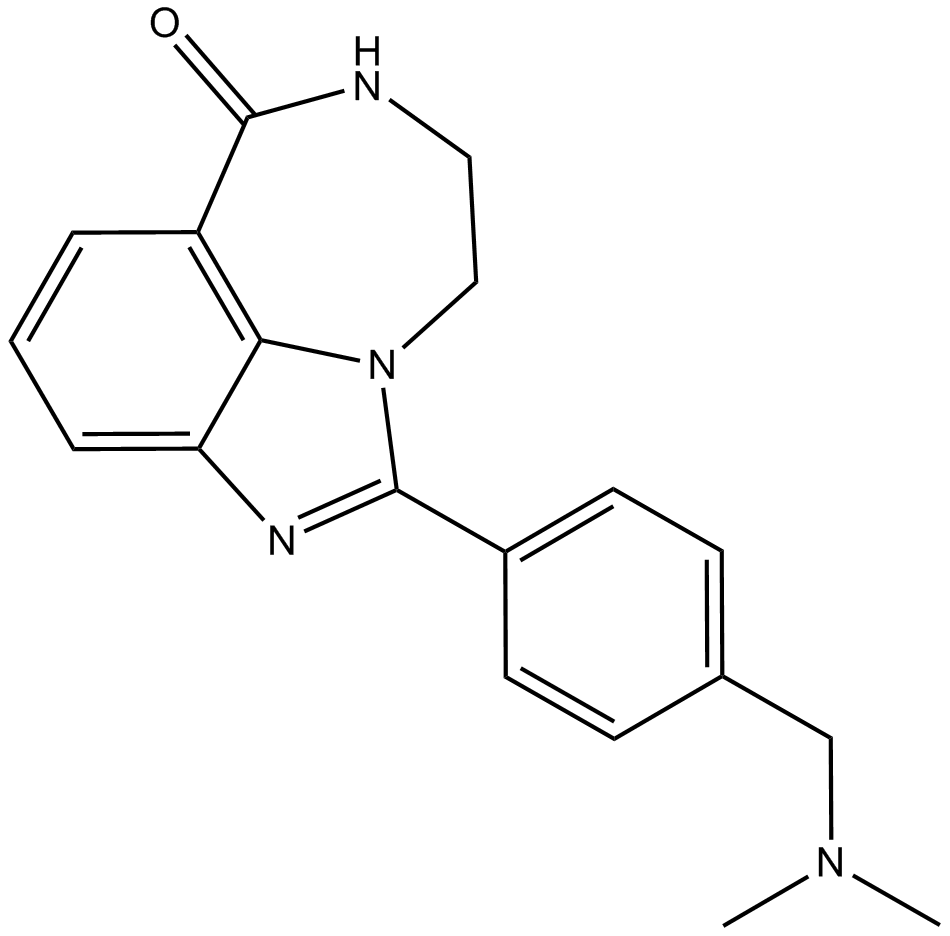AG-14361 |
| Catalog No.GC16318 |
A PARP1 inhibitor
Products are for research use only. Not for human use. We do not sell to patients.

Cas No.: 328543-09-5
Sample solution is provided at 25 µL, 10mM.
AG-14361 is a selective inhibitor of PARP-1 with Ki50 value <5 nM [1].
PARP1 is a member of PRAP family and plays an important role in many cellular processes, such as DNA repair, programmed cell death. It has been revealed that PARP1 is abnormally expressed in a variety of cancers and many PARP inhibitors have been developed as the anti-tumor drugs [1] [2] [3, 4].
AG-14361 is a potent PARP-1 inhibitor. When exposed HR and BRCA2-defective cells and parental cells to AG-14361, HR-defective cells were hypersensitive to the AG-14361 even at non-cytotoxic concentrations and lacking BRCA2 made the cells more sensitive to AG-14361 [5]. In human K562 cells, AG14361 treatment for 16 hours resulted in significant (~2-fold) potentiation of camptothecin-induced growth inhibition (GI50, 16 hours, camptothecin + AG14361 2.4 ± 0.1 nmol/L), cytotoxicity (LC50, camptothecin + AG14361 2.77 ± 0.55 nmol/L) and DNA single-strand breaks via inhibiting PARP-1 [1]. When tested with MMR-proficient (HCT-Ch3, A2780, and CP70-ch3) and MMR-deficient (HCT116, CP70, and CP70-ch2) cells, MMR-proficient cells were more sensitivity to temozolomide compared with MMR-deficient cells after exposed to AG-14361 which inhibited PARP1 activity [2].
In mouse model xenografted with BRCA2-deficient and BRCA-2 proficient tumor cells, BRCA2 deficiency group had more response even completely regressed tumor compared with BRCA-2 proficient group when treated with AG-14361 [5].
References:
[1]. Smith, L.M., et al., The novel poly(ADP-Ribose) polymerase inhibitor, AG14361, sensitizes cells to topoisomerase I poisons by increasing the persistence of DNA strand breaks. Clin Cancer Res, 2005. 11(23): p. 8449-57.
[2]. Curtin, N.J., et al., Novel poly(ADP-ribose) polymerase-1 inhibitor, AG14361, restores sensitivity to temozolomide in mismatch repair-deficient cells. Clin Cancer Res, 2004. 10(3): p. 881-9.
[3]. Calabrese, C.R., et al., Anticancer chemosensitization and radiosensitization by the novel poly(ADP-ribose) polymerase-1 inhibitor AG14361. J Natl Cancer Inst, 2004. 96(1): p. 56-67.
[4]. Veuger, S.J., et al., Radiosensitization and DNA repair inhibition by the combined use of novel inhibitors of DNA-dependent protein kinase and poly(ADP-ribose) polymerase-1. Cancer Res, 2003. 63(18): p. 6008-15.
[5]. Kyle, S., et al., Exploiting the Achilles heel of cancer: the therapeutic potential of poly(ADP-ribose) polymerase inhibitors in BRCA2-defective cancer. Br J Radiol, 2008. 81 Spec No 1: p. S6-11.
Average Rating: 5 (Based on Reviews and 30 reference(s) in Google Scholar.)
GLPBIO products are for RESEARCH USE ONLY. Please make sure your review or question is research based.
Required fields are marked with *




















